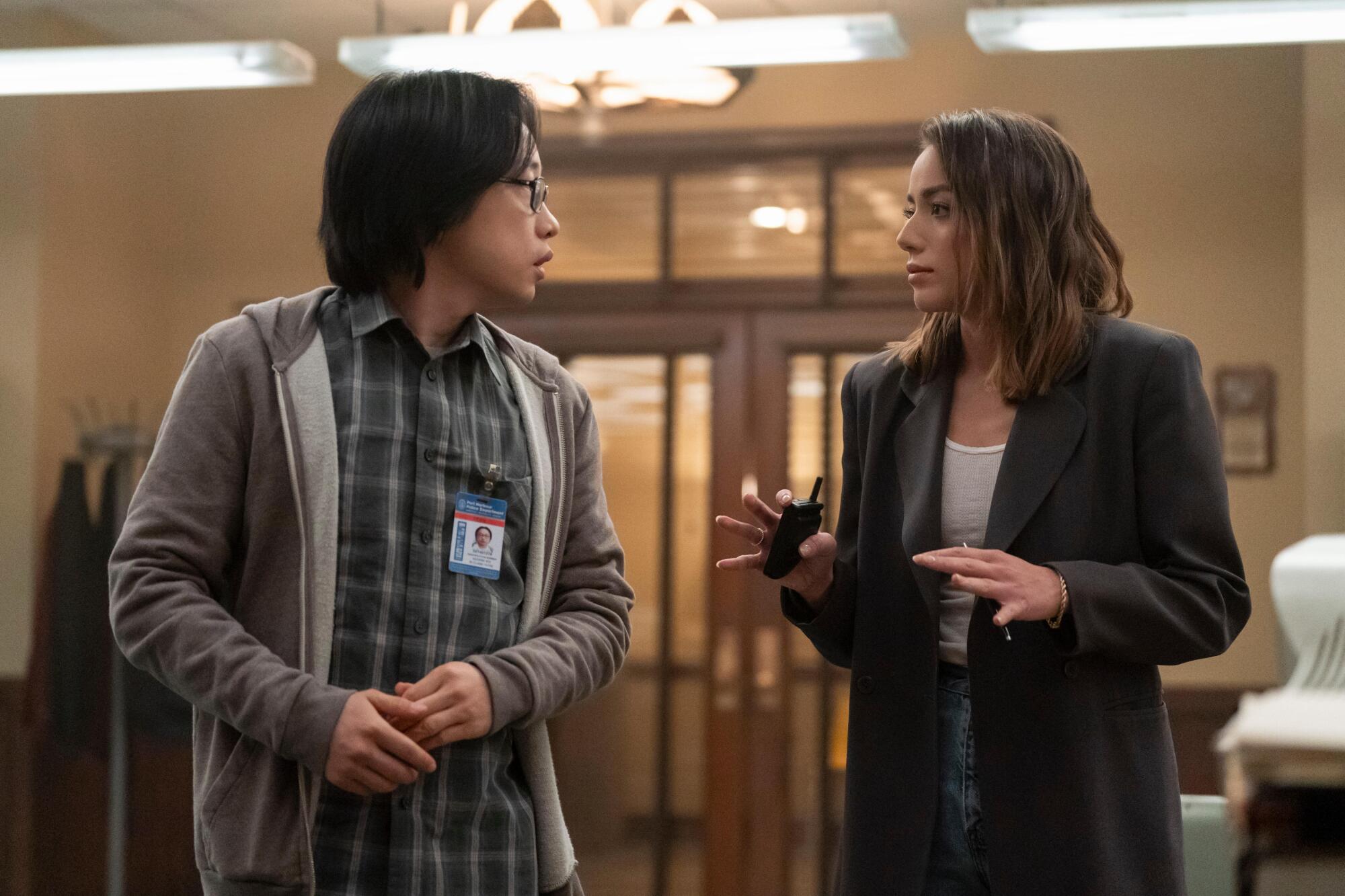
Det. Lana Lee, played by Chloe Bennet, stirs debate almost as soon as she appears on screen in Hulu’s “Interior Chinatown.”
The series, premiering Tuesday, was created by Charles Yu, and is a highly stylized adaptation of his National Book Award-winning novel of the same name. It’s set in two universes: One is a send-up of the Wolf Entertainment-produced crime procedurals that have long dominated NBC’s lineup; the other is centered on Willis Wu (Jimmy O. Yang), a waiter slumming it at a Chinatown restaurant.
Willis has always felt like he’s a background player in others’ stories, until he witnesses a crime.
Lana is brought in to help with the case because of “cultural considerations,” as Lisa Gilroy’s Det. Sarah Green snidely puts it in a televised news conference. Nevermind that Lana knows nothing about the community.
Willis is starstruck the moment he sees Lana on a tiny TV screen at work, as servers and table cleaners push around him. Who is this brilliant and beautiful woman? Can she help him forget about his life in Chinatown? But his less driven co-workers, which include best friend Fatty Choi (played by comedian Ronny Chieng), are focused on something else: her race, which they are trying to discern.

It is reminiscent of another scene that featured Bennet. In Season 3 of FXX’s comedy “Dave,” she plays Robyn, a photographer and girlfriend of the eponymous rapper in the series. The night they meet, Dave asks whether she’s Latina.
Bennet, born in Chicago as Chloe Wang — her mother is white and her father is Chinese — is used to these comments. She eventually took her father’s first name as her stage surname after she had trouble booking roles. She explained her decision in a viral 2017 Instagram comment and in subsequent interviews, saying that a casting director told her, “You’re not quite white enough for the [lead] role, but you’re not quite Asian enough for the best friend role.”
“I’m kind of used to my identity being cannon fodder,” Bennet says in a recent Zoom interview. “It’s like open territory for people to have a fun game of guessing what I could be or what I could not be, or how much I am of something.”
There are also projections that Bennet has witnessed, such as questions about her dad’s masculinity.
“The thing about internalized projections is you chalk your self-worth up to being … all right with it. But it really does put you in a position of feeling not whole,” she adds, saying that there are objective benefits to being white passing. “But that’s only if you’re thinking about existing in a flawed society. You can’t build up your psyche and your understanding of yourself based off of something that actually is arbitrary.”

These discussions were among the talking points both in “Interior Chinatown” and behind the scenes. Yu compares his book and TV show to “The Matrix” films, saying that “in the world of this show, reality looks a certain way. It doesn’t look like how we see it because we’re watching it from the outside and they’re experiencing it differently.”
Lana, he says, “understands that there are certain rules and patterns and structure to things that Willis is only beginning to understand. And that’s part of what we’re watching in the course of the story.”
(Also, for those wondering: No, Dick Wolf has not contacted Yu about his book or the series. “I live in fear but also excitement at the idea that he might actually watch this,” Yu says. “What I want to say to Mr. Wolf, if he reads this, is that his creative product has entertained me for hundreds of hours, And that comes through in a satirical nature.”)
The version of the character from the book, who is named Karen, is also biracial. Yu says that is to show that she can, for better or worse, navigate between a procedural where cardboard cop characters take out organized crime in roughly 44 minutes and another reality, where a waiter searches for his identity.
“It’s important that she seems plausible as somebody who could pass,” Yu says. “That’s the idea in the book and that’s the idea from real life [because] for a long time, there was this, I don’t know if you call it a practice, but reality for certain actors. If a show wanted to have people give some vague whiff of ethnicity, then they could cast someone [like Chloe] and push them in whatever direction.”

The TV version of this character has more attributes, in part because Yu says Bennet made him ponder questions about the character’s backstory. She says she wanted to create enough layers to the performance so that anyone who rewatches the show after knowing the twist will still find surprises and that this character who is forced to straddle two worlds “has had this identity crisis and that’s the most consistent thing about her.”
“Chloe is tactile and she has a way of making things more grounded and trying to find the reality for herself through small details,” Yu says, explaining that they’d talk about what the inside of the character’s car or apartment would look like.
Bennet, whose resume includes a starring role in ABC’s “Agents of S.H.I.E.L.D.” and a brief stint as a pop star in China — watch the video for her song “Uh Oh” if you want to see her giving strong Christina Aguilera energy — admits that she’s been obsessed with this character and story since she read “Interior Chinatown.”

“Everyone has that [moment] when you click with an author and go, ‘Oh, my God, this person has been able to communicate these really, really sticky and diluted thoughts that I’ve had in my head for years that kind of have dust on them,’ ” she says. “He woke up a part of me that was dormant in my psyche as a product of trying to navigate my racial identity in the industry. … You know, I didn’t go to college. I left high school. I have a GED from, like, a parking lot in Santa Monica. My brain grew up on TV, and so my understanding of myself was very much shaped around [what I saw of] my identity on screen.”
“Interior Chinatown” didn’t have an on-set therapist, but Bennet jokes that she gives plenty of money to her own.
After the 2016 presidential election, she co-founded RUN AAPI (Represent Us Now), an organization meant to help with Asian American and Pacific Islander representation both on and off screen. But after being very involved in the lead-up to the 2020 election, and feeling fatigued, she chose to take a step back from the group. But now, like a lot of Americans, she is conflicted about whether she should have done more in the lead-up to the 2024 election.
As for what’s next in her career, she’s working on developing a new project, though she doesn’t provide specifics. Yu says there’s potential for a second season, but audiences will have to watch to see what it might mean for Bennet’s character.
“I’ve been a vessel for a lot of different things, and I am much more interested in developing my own stories,” she says.
And like her “Interior Chinatown” character, she’s likely to get people’s attention.